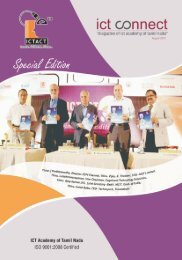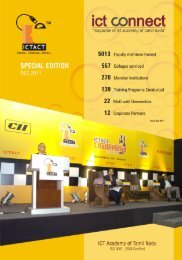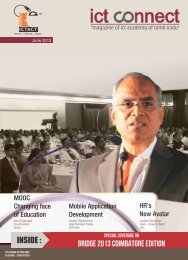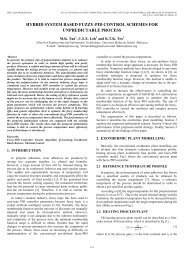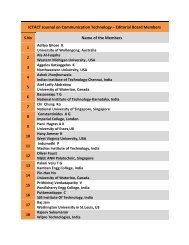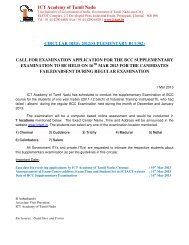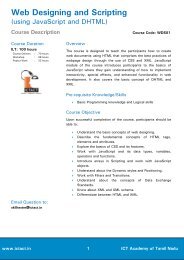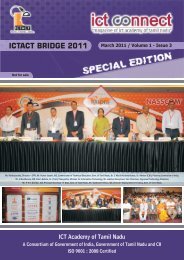Issue 1 - ICTACT.IN
Issue 1 - ICTACT.IN
Issue 1 - ICTACT.IN
You also want an ePaper? Increase the reach of your titles
YUMPU automatically turns print PDFs into web optimized ePapers that Google loves.
magazine<br />
Employability-an Industry Perspective<br />
Vijayalakshmi Rao<br />
COO & Director, Scope eKnowledge Center P Ltd.<br />
President, Empowering Women in IT<br />
Fact #1: Indians are among the youngest in the<br />
world-about 60% of the population is below 25 years of<br />
age.<br />
Fact #2: India produces about 3 million engineering<br />
graduates per annum, accounting for nearly 25% of the<br />
global output.<br />
little idea as to how to actually apply it in the workplace. In<br />
my company - for instance, we recruit engineers across all<br />
disciplines, from colleges all over Tamil-Nadu for content<br />
related work. We find most of these students very good in<br />
their concepts and attitude. However, their application<br />
orientation, communication skills and basic grooming<br />
leave a lot to be desired.<br />
Fact #3: Our state of Tamil Nadu alone produces<br />
75,000 engineers-double of what the entire US produces<br />
annually. These demographics are certainly impressive;<br />
albeit, when reviewed superficially. The actual truth is<br />
hardly as pleasant as these statistics.<br />
According to HR experts, the nation is heading<br />
towards a talent crunch. While millions graduate every<br />
year, only a small percentage of them are immediately<br />
employable. The rest need to be trained or retrained for<br />
prolonged periods in various skills before they are fit to<br />
take up employment.<br />
Job-readiness is looming as a major issue across the<br />
manufacturing and service sectors. This is especially true<br />
of the ICT sector that depends almost completely on<br />
‘human’ resources to largely meet the stringent<br />
requirements of the global marketplace. While campuses<br />
beckon, most companies are finding that they can recruit<br />
only a small percentage of graduating students. The<br />
majority, either do not meet the companies’ requirement<br />
or companies envisage where a long drawn out training<br />
process should be put in place to make the candidates<br />
‘job-ready’.<br />
The biggest reason is that engineering colleges are<br />
not yet fully attuned to the requirements of the industry.<br />
While the faculty consists of good academicians, not too<br />
many are constantly in touch with industry<br />
developments. Also, the focus of the syllabus is on<br />
textbook-based learning rather than on hands-on<br />
knowledge. This results in a situation where we have<br />
engineers who have a sound knowledge of the subject but<br />
12<br />
Employability skills are the basic skills necessary for<br />
getting and retaining a job and performing well in a given<br />
role. ICT companies, necessitated as they are to constantly<br />
keep an eye on margins and ROI tend to look for the best<br />
value-for-money when it comes to employment. Once an<br />
engineering graduate is recruited, he is required to<br />
immediately start functioning in his/her role with very<br />
little investment in training. Companies are quick to sizeup<br />
prospective employees. While the CV is a giveaway<br />
more often than not, the test/interview is a sure indication<br />
on the candidate’s job-readiness.<br />
Academic and domain skills retain their slot as the<br />
most important factor in determining employability.<br />
These are the most basic hard skills, and reflected by the<br />
marks scored, subjects/ electives covered, area of<br />
specialization, etc. While the job may not necessarily<br />
utilize that knowledge (for example, an IT firm may<br />
recruit a non-IT engineering graduate for a programming<br />
job), the candidate’s knowledge and comprehension skills<br />
are likely to be assessed. Projects/internships undertaken<br />
during the course, which are of relevance for the position<br />
applied for, carry a premium.<br />
Higher order thinking skills also play a key role in<br />
employability. These include analytical skills,<br />
lateral/creative thinking skills, etc. Companies typically<br />
judge this by the nature of projects independently<br />
undertaken, participation in technical competitions,<br />
papers published, etc. Candidates with such skills are seen<br />
to require less training than those that come with academic<br />
credentials alone. They may also have the potential to<br />
take up value-added roles faster.<br />
ICT CONNECT MAGAZ<strong>IN</strong>E



